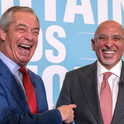The opening speech at this year’s Ukip conference culminated in a cry: “We’re looking for a referendum on Europe. Now!” No huge policy surprises there, then, but it seemed to please the crowd, who met the announcement with raucous applause.
This was different to previous conferences, though. “A lot of interest this year,” the steward had said proudly as he led me to my seat. He was right—unlike previous years, the place was filled with journalists and camera crews. It’s the first time in five years that their conference has been held in London, and it was held in Westminster Central Hall, on Parliament Square, as if presenting a challenge to the politicians currently residing in the building opposite.
Since earlier this year, Ukip has pushed ahead in the polls to become Britain’s third most popular party. Throughout the morning there were efforts to stress that, despite its reputation for conservatism and traditionalism, this is the party of the future. “We’re forward thinking, we’re modern,” declared deputy leader Paul Nuttall. A Ukip billboard van parked outside the building even referred to the three “old” parties—not the “other” ones, but the “old” ones.
They seem to have overtaken the Liberal Democrats already, and the risk they pose to the Conservatives is well known, so they turned their attention to the Labour Party. “Labour voters are easy pickings for Ukip,” claimed Nuttall, with the party having caused Labour some discomfort in recent years by finishing second in by-elections in Barnsley, Middlesbrough and most recently South Shields—Labour strongholds. “It’s clear that Ukip is the major competition, the only competition, to Labour in the north,” he said. Labour no longer represents the interests of the working classes, he claimed, and Ukip is the answer—“it’s the working classes who are most affected by mass immigration.”
There were efforts to show that this party is not Europe-hating, but EU-hating. European politicians took to the stage—speakers from eurosceptic parties in Finland and Bulgaria, who often appear at Ukip conferences. One supporter turned up in a Ukip branded jumper bearing the slogan: “Love Europe, Hate The EU.” Without specifically mentioning the latest allegations of xenophobia to haunt the party—Godfrey Bloom’s infamous “Bongo Bongo land” remark and the concerns of Nigel Farage’s school teachers—there was an obvious attempt to combat them. The phrase “we are against racism and extremism” was a leitmotif of the morning.
And there were some attempts to show that this is not a one-policy party. Speakers talked about the need to move away from welfare as a solution to poverty, called for greater use of shale gas and the establishment of a British sovereign wealth fund, and for the return of grammar schools, claiming that all the other parties have abandoned social mobility (not that grammar schools would necessarily help—see Philip Collins on “The social mobility myth” in the latest issue of Prospect). As usual, there was plenty of talk about "common sense."
And then Nigel Farage was introduced. The audience began to shift in their seats with anticipation before he’d even entered the room, preparing themselves for a speech that (unsurprisingly) was to centre around immigration, Europe and the drive towards victory at the European elections next year ("we must turn the European elections into the referendum that we have not been given," he said). The doors flung open and in he came, accompanied by punchy disco music and surrounded by flashing cameras. The crowd leapt to its feet, whooping and cheering and wolf-whistling. I’ve rarely seen such a standing ovation (in noticeable contrast to the one directed towards Danny Alexander and witnessed by my colleague Jonathan Derbyshire at the Liberal Democrat conference earlier this week—“the most tepid I’ve ever heard”). One man in the centre of the room jumped up with such enthusiasm he almost toppled over. An elderly man behind me looked as though he might faint. If you hadn’t known any better, you’d be forgiven for thinking the man who had just entered the room was a boxing star, a huge celebrity, heading towards the arena. But when he got to the front and climbed to the stage, it was just a sweaty-faced Nigel Farage.
His speech was full of fight, though. “Over the last 18 months, something remarkable has been happening and we are now changing the face of British politics,” he said. “By the next general election we will have the third largest membership of any party… Let us send an earthquake through Westminster.” Practically every sentence he uttered was met with applause, and the enthusiasm continued through to the end of his speech.
Say what you like about Ukip’s single-minded focus, half-baked policies and controversial members. There’s certainly passion for this party.
Ukip's little earthquake
September 20, 2013












